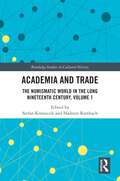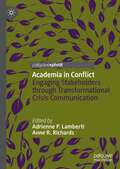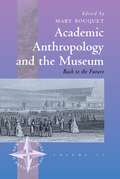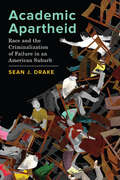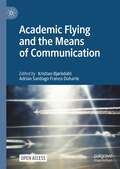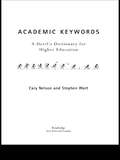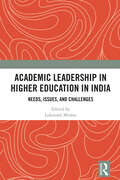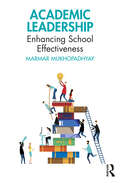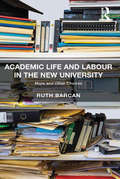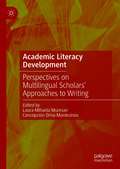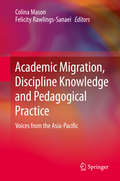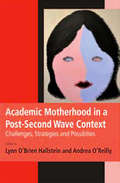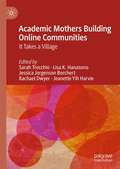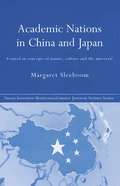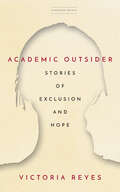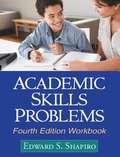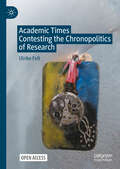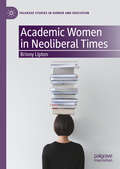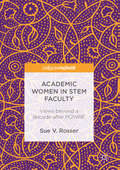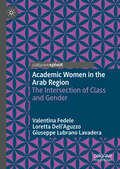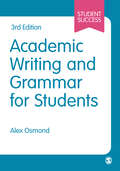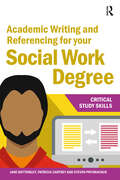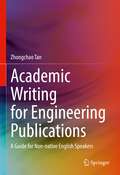- Table View
- List View
Academia and Trade: The Numismatic World in the Long Nineteenth Century, Volume 1 (Routledge Studies in Cultural History)
by Stefan Krmnicek Hadrien RambachThis first part of a 2-volume collection comprises a collection of essays in English by leading scholars on the 19th-century Academia and Trade presenting the latest developments in international scholarship on the numismatic world in the long 19th century. In the 19th century, developments in the study and collection of coins set the cornerstone for modern numismatics. This volume comprises a collection of essays in English by international leading scholars that highlight significant figures of the 19th-century research and the state of the numismatic trade in their time. Centering around collectors and scholars of ancient, medieval, and modern numismatics, and on non-Western coinage and medals against the backdrop of the political, cultural, economic, and social changes of the era, this book presents the latest scholarship on numismatics’ contribution to the cultural history of the 19th century. This volume is essential for students and scholars alike interested in 19th -century history and the history of coins.
Academia in Conflict: Engaging Stakeholders through Transformational Crisis Communication
by Anne R. Richards Adrienne P. LambertiThis book explores communication as a key influence on the trajectory of conflicts and crises in the specific context of academia. From the ideological responsibilities of academia to the profit-seeking motives of institutions, the authors explore challenges facing faculty across multiple disciplines. Critique of the higher education industry is more necessary than ever in the context of academic corporatization and marketization. Academia in Conflict reveals how institutional discourses can contribute to or mitigate conflict and crisis, offering communication practices that prioritize stakeholder experiences and needs. Enduring academic crises are addressed, including declines in public funding, mental health emergencies, and threats to job stability. Academia in Conflict provides crucial insights for navigating the challenges of higher education today.
Academic Anthropology and the Museum
by Mary BouquetThere is ample evidence that anthropologists are among those whose imaginations have been fired by the museum, over the past fifteen to twenty years.
Academic Apartheid: Race and the Criminalization of Failure in an American Suburb
by Sean J. DrakeIn Academic Apartheid, sociologist Sean J. Drake addresses long-standing problems of educational inequality from a nuanced perspective, looking at how race and class intersect to affect modern school segregation. Drawing on more than two years of ethnographic observation and dozens of interviews at two distinct high schools in a racially diverse Southern California suburb, Drake unveils hidden institutional mechanisms that lead to the overt segregation and symbolic criminalization of Black, Latinx, and lower-income students who struggle academically. His work illuminates how institutional definitions of success contribute to school segregation, how institutional actors leverage those definitions to justify inequality, and the ways in which local immigrant groups use their ethnic resources to succeed. Academic Apartheid represents a new way forward for scholars whose work sits at the intersection of education, race and ethnicity, class, and immigration.
Academic Flying and the Means of Communication
by Kristian Bjørkdahl Adrian Santiago Franco DuharteThis open access book shines a light on how and why academic work became entwined with air travel, and what can be done to change academia’s flying habit. The starting point of the book is that flying is only one means of scholarly communication among many, and that the state of the planet now obliges us to shift to other means. How can the academic-as-globetrotter become a thing of the past? The chapters in this book respond to this call in three steps. It documents the consequences of academic flying, it investigates the issue of why academics fly, and it begins an effort to think through what can replace flying, and how. Finally, it confronts scholars and scientists, students, activists, research funders, university administrators, and others, with a call to translate this research into action.
Academic Keywords: A Devil's Dictionary for Higher Education
by Cary Nelson Stephen WattKnow what academic freedom is? Or what it's come to mean? What's affirmative about affirmative action these days? Think you're up on the problem of sexual harassment on campus? Or know how much the university depends on part-time faculty? Academic Keywords is a witty, informed, and sometimes merciless assessment of today's campus, an increasingly corporatized institution that may have bitten off more than its administration is ready to chew. Cary Nelson and Steve Watt use the format of a dictionary to present stories and reflections on some of the most pressing issues affecting higher education in America. From the haphazard treatment of graduate students to the use and abuse of faculty (as well as abuses commited by faculty), Nelson and Watt present a compelling and, at times, enraging report on the state of the campus.
Academic Leadership in Higher Education in India: Needs, Issues, and Challenges
by Lokanath MishraThis volume focuses on the need to establish good leadership in academic settings and higher education institutions in India. It provides an understanding of the higher education system, knowledge, skills, and experience required for better leadership and management of academic institutions. The book highlights the importance of practising data-driven decision making for leaders of dynamic organizations within a complex social, political, and economic environment. It explores how a systematic leadership programme needs to be developed to ensure academic leadership effectiveness. While discussing federal and state systems of higher education, policies and regulations, key leadership strategies for improved institutional performance and better institutional governance, the volume outlines how effective academic leadership helps in building teams, nurturing staff, strengthening alliances, developing research capacity and strategic planning, and renewing academic programmes.This volume will be of interest to teachers, students, and researchers of education, higher education, management education, and political economy. It will also be useful for academicians, policy makers, management leaders, and academic leaders.
Academic Leadership: Enhancing School Effectiveness
by Marmar MukhopadhyayThis book provides contemporary knowledge on school effectiveness and proposes strategic interventions for enhancing it. It focuses on improving academic leadership for enhancing the effectiveness of schools and discusses how national education policies are helpful in providing a vision towards improving school effectiveness. It highlights the role of teachers as academic leaders in the implementation of policy recommendations at school and classroom levels. It offers methods and mechanisms for academic leaders to measure the learning of students for school assessment. The author also discusses how academic leadership involves creating a vision and mission based on science and research data for the organisation, inspiring innovation and creative ideas, developing teamwork, and a safe environment for staff to express their views. While providing an understanding of school as an organization, the volume outlines its management functions such as processes and quality of planning, management of curriculum, learner evaluation, institutional networks, and human resource management, among others. The volume is a guidebook for training and capacity building for school-level practitioners and leaders in education management. Embedded with real-life cases and episodes, this volume will be of interest to teachers, students, and practitioners of education, management, and education management. It will also be useful for academicians, educationalists, practitioners, management professionals, educational leaders, and policymakers.
Academic Life and Labour in the New University: Hope and Other Choices
by Ruth BarcanWhat does it mean to be an academic today? What kinds of experiences do students have, and how are they affected by what they learn? Why do so many students and their teachers feel like frauds? Can we learn to teach and research in ways that foster hope and deflate pretension? Academic Life and Labour in the New University: Hope and Other Choices addresses these big questions, discussing the challenges of teaching and researching in the contemporary university, the purpose of research and its fundamental value, and the role of the academy against the background of major changes to nature of the university itself. Drawing on a range of international media sources, political discourse and many years’ professional experience, this volume explores approaches to teaching and research, with special emphasis on the importance of collegiality, intellectual honesty and courage. With attention to the intersection of large-scale institutional changes and intellectual shifts such as the rise of transdisciplinarity and the development of a pluralist curriculum, this book proposes the pursuit of more ethical, compassionate and critical forms of teaching and research. As such, it will be of interest not only to scholars of cultural studies and education, but to all those who care about the fate of the university as an institution, including young scholars seeking to join the academy.
Academic Literacy Development: Perspectives on Multilingual Scholars' Approaches to Writing
by Laura-Mihaela Muresan Concepción Orna-MontesinosThis edited book brings together an international cast of contributors to examine how academic literacy is learned and mastered in different tertiary education settings around the world. Bringing to the fore the value of qualitative enquiry through ethnographic methods, the authors illustrate in-depth descriptions of genre knowledge and academic literacy development in first and second language writing. All of the data presented in the chapters are original, as well as innovative in the field in terms of content and scope, and thought-provoking regarding theoretical, methodological and educational approaches. The contributions are also representative of both novice and advanced academic writing experiences, providing further insights into different stages of academic literacy development throughout the career-span of a researcher. Set against the backdrop of internationalisation trends in Higher Education and the pressure on multilingual academics to publish their research outcomes in English, this volume will be of use to academics and practitioners interested in the fields of Languages for Academic Purposes, Applied Linguistics, Literacy Skills, Genre Analysis and Acquisition and Language Education.
Academic Migration, Discipline Knowledge and Pedagogical Practice: Voices from the Asia-Pacific
by Colina Mason Felicity Rawlings-SanaeiThis volume makes a distinctive and innovative contribution to the globalisation of higher education literature by highlighting the myriad benefits of academic migration. Sixteen academic migrants across the Asia-Pacific region reflect on their experiences and wisdom gained across geographical, cultural and disciplinary domains. Each one provides an authentic account of ways in which their experiences and insights have benefited their host institutions and enhanced their pedagogical practice. The groundbreaking volume calls for a shift in academic culture - one in which academic migrants are respected for their cultural, social and intellectual resources, their enhanced interpretive ability and their capacity to view the world through multiple lenses. Are these not the characteristics of educators which universities seek in their efforts to internationalise their institutions and develop in their students an understanding of global citizenship? The volume forges new territory in articulating the relationship between academic migrants, conceptual understanding and the construction of knowledge. The following themes are addressed in this book: Migration of Ideas, Conceptual Understanding and Pedagogical Enrichment Indigenous Pedagogies and Bridging Worldviews Changing Academic Identities and Reshaping Pedagogies Teaching Practice and the Academic Diaspora.
Academic Motherhood in a Post Second Wave Context
by Hallstein Lynn O'BrienContributors detail what it means to be an academic mother and to think about academic motherhood, while also exploring both the personal and specific institutional challenges academic women face, the multifaceted strategies different academic women are implementing to manage those challenges, and investigating different theoretical possibilities for how we think about academic motherhood.
Academic Mothers Building Online Communities: It Takes a Village
by Rachael Dwyer Sarah Trocchio Lisa K. Hanasono Jessica Jorgenson Borchert Jeanette Yih HarvieThis volume focuses on the diverse ways in which mothers working within academia seek to find others with similar experiences to build virtual communities. Although the faculty and student populations of universities have diversified, mothers in academia are disproportionately overrepresented in precarious faculty and staff positions and continue to experience myriad institutional and interpersonal barriers, such as gender wage gaps that are exacerbated by stop-the-clock tenure policies, inadequate parental leave policies, expensive or scarce local childcare options, and social biases. The book gives space to the many ways women create and challenge their own versions of motherhood through a digital “village,” examining how academic mothers use virtual communities to seek and enact different kinds of support.
Academic Nations in China and Japan: Framed by Concepts of Nature, Culture and the Universal (Nissan Institute/Routledge Japanese Studies)
by Margaret SleeboomThe descriptions Chinese and Japanese people attribute to themselves and to each other differ vastly and stand in stark contrast to Western perceptions that usually identify a 'similar disposition' between the two nations. Academic Nationals in China and Japan explores human categories, how academics classify themselves and how they divide the world into groups of people.Margaret Sleeboom carefully analyses the role the nation-state plays in Chinese and Japanese academic theory, demonstrating how nation-centric blinkers often force academics to define social, cultural and economic issues as unique to a certain regional grouping. The book shows how this in turn contributes to the consolidating of national identity while identifying the complex and unintended effects of historical processes and the role played by other local, personal and universal identities which are usually discarded.While this book primarily reveals how academic nations are conceptualized through views of nature, culture and science, the author simultaneously identifies comparable problems concerning the relation between social science research and the development of the nation state. This book will appeal not only to Asianists but also to those with research interests in Cultural Studies and Sinology.
Academic Outsider: Stories of Exclusion and Hope
by Victoria ReyesMany enter the academy with dreams of doing good; this is a book about how the institution fails them, especially if they are considered "outsiders." Tenure-track, published author, recipient of prestigious fellowships and awards—these credentials mark Victoria Reyes as somebody who has achieved the status of insider in the academy. Woman of color, family history of sexual violence, first generation, mother—these qualities place Reyes on the margins of the academy; a person who does not see herself reflected in its models of excellence. This contradiction allows Reyes to theorize the conditional citizenship of academic life—a liminal status occupied by a rapidly growing proportion of the academy, as the majority white, male, and affluent space simultaneously transforms and resists transformation. Reyes blends her own personal experiences with the tools of sociology to lay bare the ways in which the structures of the university and the people working within it continue to keep their traditionally marginalized members relegated to symbolic status, somewhere outside the center. Reyes confronts the impossibility of success in the midst of competing and contradictory needs—from navigating coded language, to balancing professional expectations with care-taking responsibilities, to combating the literal exclusions of outmoded and hierarchical rules. Her searing commentary takes on, with sensitivity and fury, the urgent call for academic justice.
Academic Profiling: Latinos, Asian Americans, and the Achievement Gap
by Gilda L. OchoaToday the achievement gap is hotly debated among pundits, politicians, and educators. In particular this conversation often focuses on the two fastest-growing demographic groups in the United States: Asian Americans and Latinos. In Academic Profiling, Gilda L. Ochoa addresses this so-called gap by going directly to the source. At one California public high school where the controversy is lived every day, Ochoa turns to the students, teachers, and parents to learn about the very real disparities—in opportunity, status, treatment, and assumptions—that lead to more than just gaps in achievement.In candid and at times heart-wrenching detail, the students tell stories of encouragement and neglect on their paths to graduation. Separated by unequal middle schools and curriculum tracking, they are divided by race, class, and gender. While those channeled into an International Baccalaureate Program boast about Socratic classes and stress-release sessions, students left out of such programs commonly describe uninspired teaching and inaccessible counseling. Students unequally labeled encounter differential policing and assumptions based on their abilities—disparities compounded by the growth in the private tutoring industry that favors the already economically privileged.Despite the entrenched inequality in today&’s schools, Academic Profiling finds hope in the many ways students and teachers are affirming identities, creating alternative spaces, and fostering critical consciousness. When Ochoa shares the results of her research with the high school, we see the new possibilities—and limits—of change.
Academic Skills Problems, Fourth Edition
by Edward ShapiroThis popular practitioner guide and text presents an effective, problem-solving-based approach to evaluating and remediating academic skills problems. Leading authority Edward S. Shapiro provides practical strategies for working with students across all grade levels (K-12) who are struggling with reading, spelling, written language, or math. Step-by-step guidelines are detailed for assessing students' learning and their instructional environment, using the data to design instructional modifications, and monitoring student progress. The research base for the approach is accessibly summarized. The companion workbook, available separately, contains practice exercises and reproducible forms. New to This Edition Incorporates the latest advances in evidence-based assessment and instruction. Shows how the author's approach fits perfectly into a response to intervention (RTI) model. Chapter and extended case example focusing on RTI.30 of the figures, tables, and forms are new or revised.
Academic Times: Contesting the Chronopolitics of Research
by Ulrike FeltThis open access book explores the hidden politics of time—the chronopolitics—that profoundly shapes the contours of academic life and knowledge production in contemporary universities. Moving beyond familiar critiques of academic acceleration, Ulrike Felt explores the diversity of time generators and the resultant complex, multilayered timescapes that govern scholarly work and life. The book examines the tensions inherent in models of linear careers and in simultaneous experiences of speed and waiting, and asks questions about the ownership of time. In doing so, it scrutinizes relations between time and quality, and points to the impact of time on how and what we can know, revealing how these temporal regimes create deep asynchronicities and fragmentations and perpetuate injustices and exclusions. Arguing for a more mindful approach to research, Felt advocates for rethinking academia through the lens of time, emphasizing the need for temporal care work in order to achieve sustainable and responsible change. Aimed at researchers, academic leaders, and policymakers, the book offers a compelling vision for a more responsive, long-term, and equitable academic future—one that challenges neoliberal models that prioritise speed, competitiveness, and efficiency.
Academic Women in Neoliberal Times (Palgrave Studies in Gender and Education)
by Briony LiptonThis book investigates the gendered dimensions of academic life in the contemporary Australian university. It examines key discourses – most notably academic performativity and identity – through a feminist lens, and scrutinises how discourses of neoliberalism and feminism are entangled in the structure, systems, operations and cultures of the university. Drawing on in-depth qualitative interviews with academic women in Australia, the author uses a mix of experimental methods to emphasise the performative and discursive decisions women make with regard to their academic careers. In doing so, this book reveals how women themselves generate neoliberal and feminist shifts, how they manage the contradictions they produce, and how they carve spaces of influence and authority. Moving towards a re-evaluation of existing discourses, this book offers new insights into gender inequality in the Australian university in neoliberal times.
Academic Women in STEM Faculty: Views beyond a decade after POWRE
by Sue V. RosserThis volume examines major issues facing successful women in academic science. In doing so, Sue Rosser outlines the persisting and shifting perspectives of women who have achieved seniority and remained in academia during the last fifteen years through survey data from women who received POWRE awards from the NSF. Some evidence suggests that budget cuts and an increasing reliance on technology have impacted higher education and exacerbated gender issues, but until now, little research has focused directly on the lingering effects of these changes.
Academic Women in the Arab Region: The Intersection of Class and Gender
by Valentina Fedele Loretta Dell’Aguzzo Giuseppe Lubrano LavaderaThis book offers the first systematic study of gender equality in academia in the South Mediterranean region, with a unique focus on the intersection of gender and class. Drawing on rich qualitative data from in-depth interviews with female academics in the region, this analysis moves beyond traditional bibliometric approaches to explore the deeper structural factors behind women&’s underrepresentation in senior academic roles. By combining survey, web scraped and interview data, the book examines the challenges women face throughout their careers and investigates whether female academics share the same socio-economic backgrounds as women in the wider society, or if they come from more privileged groups. In particular, this book considers whether those who succeed in academia possess higher levels of family capital. This analysis sheds light on the complex dynamics shaping women&’s academic trajectories in the region. It will be of interest to students and scholars in gender studies, intersectional economics, education, and Middle Eastern and North African (MENA) studies.
Academic Writing and Grammar for Students (Student Success)
by Alex OsmondFrom grammar and punctuation, to proofreading and fixing mistakes, this is your one-stop guide to improving your academic writing to achieve better grades at university. Including quotes from tutors and examples of good and bad practice, this book provides step-by-step guidance on Basic conventions of academic writing Critical thinking Conciseness and clarity Proofreading and referencing Common mistakes and how to avoid them. Student Success is a series of essential guides for students of all levels. From how to think critically and write great essays to boosting your employability and managing your wellbeing, the Student Success series helps you study smarter and get the best from your time at university.
Academic Writing and Grammar for Students (Student Success)
by Alex OsmondFrom grammar and punctuation, to proofreading and fixing mistakes, this is your one-stop guide to improving your academic writing to achieve better grades at university. Including quotes from tutors and examples of good and bad practice, this book provides step-by-step guidance on Basic conventions of academic writing Critical thinking Conciseness and clarity Proofreading and referencing Common mistakes and how to avoid them. Student Success is a series of essential guides for students of all levels. From how to think critically and write great essays to boosting your employability and managing your wellbeing, the Student Success series helps you study smarter and get the best from your time at university.
Academic Writing and Referencing for your Social Work Degree (Critical Study Skills)
by Jane Bottomley Steven Pryjmachuk Patricia CartneyIf you are embarking on a university social work degree the books in this series will help you acquire and develop the knowledge, skills and strategies you need to achieve your goals. They provide support in all areas important for university study, including institutional and disciplinary policy and practice, self-management, and research and communication. Tasks and activities are designed to foster aspects of learning which are valued in higher education, including learner autonomy and critical thinking, and to guide you towards reflective practice in your study and work life.Academic Writing and Referencing for your Social Work Degree provides you with a sound knowledge and understanding of: what constitutes good academic writing in social work a range of strategies for writing successful essays and reports the importance of clarity and coherence in your writing about education how to improve your academic style, grammar and punctuation, and formatting and presentation referencing conventions in the field of social work, and of how to avoid plagiarism.
Academic Writing for Engineering Publications: A Guide for Non-native English Speakers
by Zhongchao TanThis textbook is designed for non-native English speakers who need to write scientific and engineering research articles, technical reports, engineering thesis, academic books, and other technical documents in English. The author focuses on formal academic writing in a professional language and frame. The book is written in standard English and provides useful guidelines on development of thoughts, organization of ideas, construction of paragraphs and sentences, and choices of precise words. It also pays attention to details such as visual creation, punctuation, and format. Informal writing is excluded from the scope of this practical guideline.
